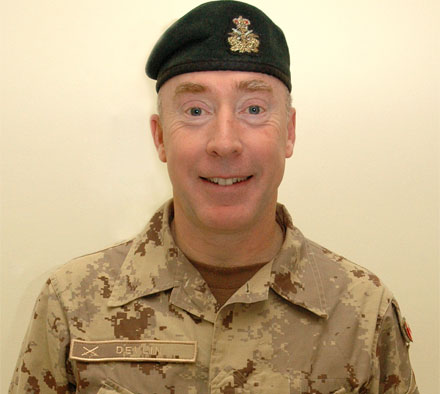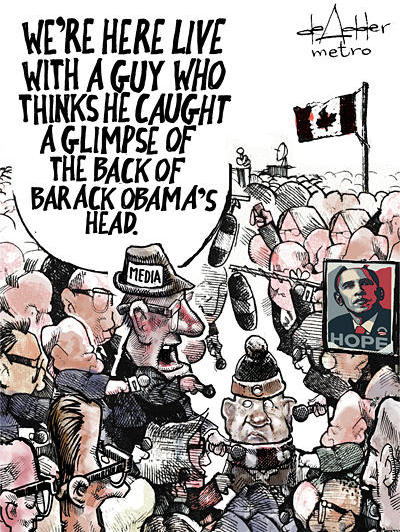 While answering a question last night at the St. Lawrence debate, I mentioned that it’s important for us to realize that there are currently Canadian military officers serving in Iraq as part of the American command. Bob Rae interrupted me to object adamantly, almost angrily. “No there aren’t!”
While answering a question last night at the St. Lawrence debate, I mentioned that it’s important for us to realize that there are currently Canadian military officers serving in Iraq as part of the American command. Bob Rae interrupted me to object adamantly, almost angrily. “No there aren’t!”
Yes, I said, there are. “No there aren’t,” Mr. Rae said again. “They’re part of our military exchange program,” I explained. (I’m paraphrasing from memory for now, but will be able to check the tape later and will post the video when I can. UPDATE [March 13th @ 10:21pm]: Video of this exchange is now available, in both full and shortened versions.) Strangely, Mr. Rae demanded I tell him where in Iraq our officers were stationed, as if my inability to do so would prove they weren’t there.
At that point, seeing no immediate resolution to our disagreement, I moved on with the rest of my answer. Today, however, having confirmed that I was correct, I’m quite taken aback that Mr. Rae could have been so misinformed about our military’s exchange program with the United States and our direct involvement in the war in Iraq. It’s made worse by the fact that Mr. Rae isn’t just any Liberal candidate: he’s the party’s foreign affairs critic.
Ironically, some of the first criticisms of Canadian involvement in Iraq were directed at the Liberal government in 2003, and came from then-opposition Alliance Leader Stephen Harper. At the time, CTV reported that “there are currently 31 Canadian military officers serving with U.S. forces in Iraq.”
Then on December 14, 2006, according to this US military website, Canadian Maj. Gen. Peter Devlin became the MNC-I (Multi National Corps – Iraq) Deputy Command General. He’s even photographed for the CENTCOM website wearing a Canadian uniform.
Finally, in January 19th 2008, just two months ago and during this election campaign, Canwest News Service reported that Canadian Forces Brig.-Gen. Nicolas Matern had “recently arrived in Baghdad” to take “a leading roll in Iraq.” The report also confirmed that “a number of high ranking Canadian officers have been involved in helping direct operations in the Iraq conflict,” and offered this summary:
In 2004 Lt.-Gen. Walter Natynczyk, then a major general, served as deputy commander of the Multi-National Corps during operation Iraqi Freedom.
At the time, he was in charge of 35,000 soldiers. Natynczyk oversaw planning and execution of all multi-national corps-level combat support operations.
For his service in Iraq, Governor General Michaelle Jean, presented him with the Meritorious Service Cross.
At the time, the press release noted Natynczyk’s pivotal role in the development of numerous plans and operations “resulted in a tremendous contribution by the Multi-National Corps to Operation Iraqi Freedom, and has brought great credit to the Canadian Forces and to Canada.”
Canadian Maj.-Gen. Peter Devlin was also recently a deputy commander in the multi-national corps.
Other Canadian soldiers have served in front-line positions. In May 2003 a Canadian Forces exchange officer was wounded near Baghdad airport after a grenade exploded next to the convoy he was traveling in. At the time there were 16 Canadian military members serving on exchange programs with various foreign forces involved in the Iraq war.
So, Canadian officers have been serving in Iraq since at least 2003 as discussed in both the House of Commons and the mainstream media. Further, our soldiers have actually been in front-line positions and even been wounded.
How is it possible that the Liberal foreign affairs critic was not only unaware of these basic facts, but was so sure of the opposite that he forcefully interrupted to contradict me – not once, but repeatedly? Mr. Rae is a good orator and a good candidate, but this raises some serious questions regarding his knowledge of his own portfolio.

 While answering a question last night at the St. Lawrence debate, I mentioned that it’s important for us to realize that there are currently Canadian military officers serving in Iraq as part of the American command. Bob Rae interrupted me to object adamantly, almost angrily. “No there aren’t!”
While answering a question last night at the St. Lawrence debate, I mentioned that it’s important for us to realize that there are currently Canadian military officers serving in Iraq as part of the American command. Bob Rae interrupted me to object adamantly, almost angrily. “No there aren’t!”